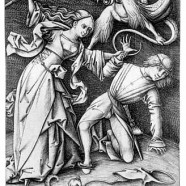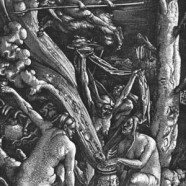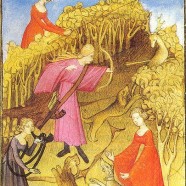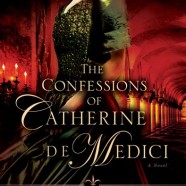Witch Persecutions, Women, and Social Change–Germany: 1560 – 1660
“The Evil Wife” by Israhel van Meckenem, 1440/1445-1503A woman, encouraged by a demon, beats her husband with her distaff.PART TWOBy the latter half of the 15th century, the feudal agrarian economy was beginning to crumble, while the capitalist market economy was growing more and more powerful, as did economic competition between men and women. Men active in the market economy tried to further their interests by simultaneously excluding women from many professions and trying to marginalize the domestic economy by claiming that home-produced goods were inferior to shop-produced...
Read MoreWitch Persecutions, Women, and Social Change
I recently revisited my Senior Paper, written in 1988 at the University of Minnesota. Although some of my sources are *very* dated, most of the actual historical information seems to have stood up to the test of time and, though my focus in this paper was Germany, much of this material seems prescient for what I would later write in DAUGHTERS OF THE WITCHING HILL. Especially important in my research was the realization that women in the Middle Ages actually had more economic power and independence than they did in the Renaissance and Early Modern Period. I highly recommend Joan Kelly’s...
Read MoreWriting Women Back into History
This illustration, from Wikipedia Media Commons, depicts medieval women hunting. This article of mine was originally published in the May 2008 issue of Solander Magazine, published by the Historical Novel Society.We have been lost to each other for so long. My name means nothing to you. My memory is dust. This is not your fault or mine. The chain connecting mother to daughter was broken and the word passed into the keeping of men, who had no way of knowing. That is why I became a footnote, my story a brief detour between the well-known history of my father and the celebrated chronicle of my...
Read MoreGuest Post: History’s Black Widow
This week I’d like to present a guest post by C W Gortner, author of The Confessions of Catherine de Medici. Many of you already know Gortner from his previous novel, The Last Queen, which presents a sensitive portrait of the tragically misunderstood Juana “La Loca” of Castile. Gortner has passionately rewritten the histories of these maligned women, giving them voice and allowing them to tell their stories and set the record straight. And you never know . . . he might eventually write about a 17th century Firebrand. -Mary SharrattHistory’s Black Widow: The Legend of...
Read More






